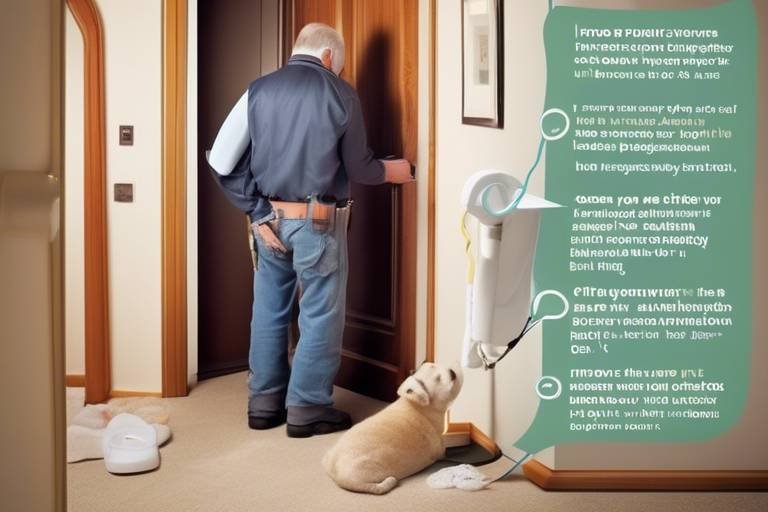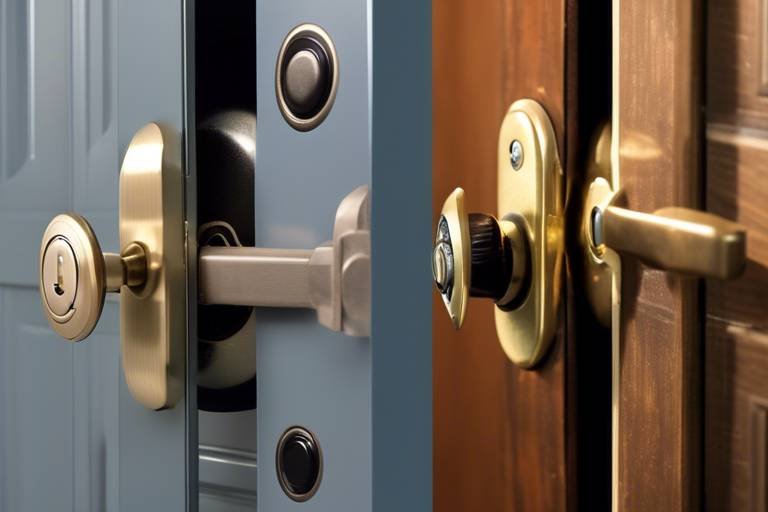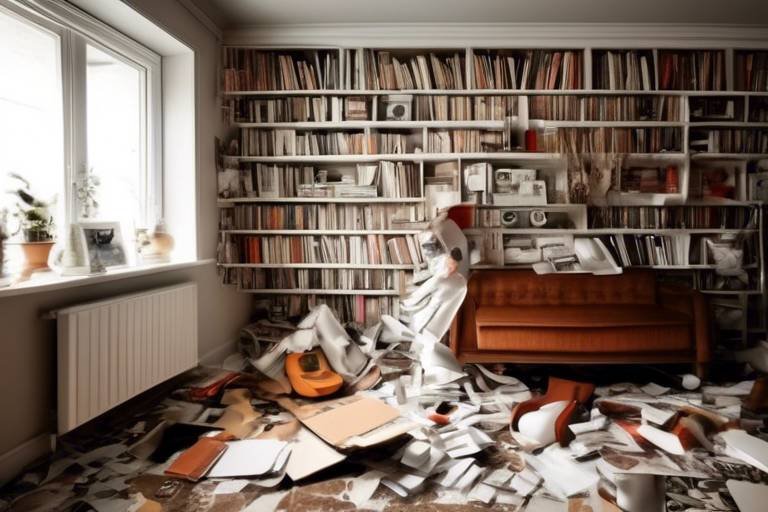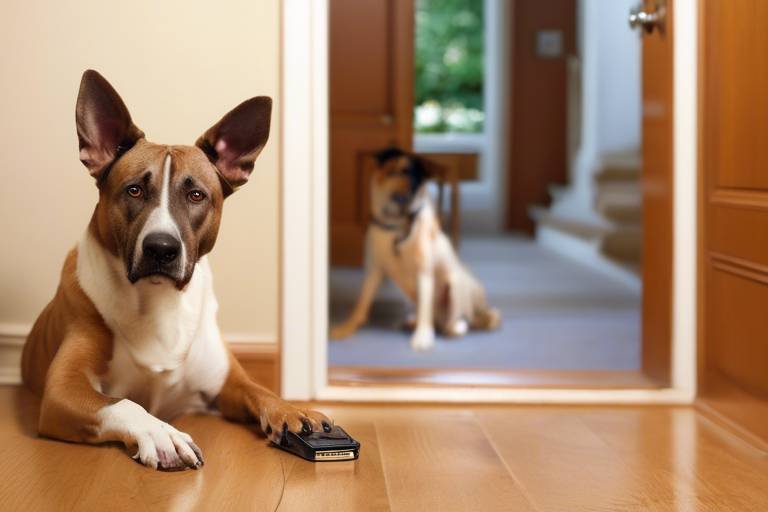Crucial Factors for an Effective Home Security System
In today's world, where uncertainties lurk around every corner, ensuring the safety of your home has never been more critical. A robust home security system acts as a fortress, safeguarding your loved ones and possessions from potential threats. But what exactly makes a home security system effective? It's not just about having a few cameras and an alarm; it's a carefully woven tapestry of various elements working together seamlessly. In this article, we will delve into the essential components that contribute to a reliable home security system, ensuring that you can enjoy peace of mind in the comfort of your own home.
Before diving headfirst into the world of security systems, it's essential to take a step back and assess your specific security needs. Every home is unique, much like a fingerprint, with its own set of vulnerabilities and strengths. Are you in a neighborhood with a high crime rate? Do you travel frequently? Or perhaps you have valuable items that require extra protection? Understanding your security needs is the first step in creating an effective home security system. Tailoring your approach to the specific risks associated with your home will ensure that you are not only protected but also that your system is efficient and cost-effective.
Once you've assessed your needs, the next step is selecting the appropriate security equipment. Think of this as choosing the right tools for a job; each piece of equipment plays a crucial role in deterring intruders and safeguarding your property. The key components typically include surveillance cameras, alarm systems, and locks. Each of these elements works in concert to create a comprehensive security strategy that can adapt to various situations.
Surveillance cameras are like the watchful eyes of your home, constantly monitoring activity around your property. They provide real-time footage and can deter potential burglars when strategically placed. Imagine having a virtual security guard that never blinks! With advancements in technology, these cameras come equipped with features like night vision, motion detection, and remote viewing capabilities, making them indispensable for modern home security.
When it comes to cameras, there are several options available:
- Wired Cameras: Known for their reliability, these cameras require a physical connection to a power source and a recording device.
- Wireless Cameras: Offering flexibility and ease of installation, these cameras connect via Wi-Fi, making them ideal for those who want to avoid complicated wiring.
- Smart Cameras: Equipped with advanced features, smart cameras can be controlled via smartphone apps, allowing for real-time monitoring and notifications.
Understanding these options helps homeowners choose the best fit for their security needs.
Proper placement of surveillance cameras enhances their effectiveness. Key locations to consider include:
- Entry points such as doors and windows
- Driveways and garages
- Blind spots around your property
By ensuring comprehensive coverage, you can significantly reduce the chances of a break-in.
A reliable alarm system is like the heartbeat of your home security setup. It alerts homeowners and authorities of potential breaches, acting as a crucial line of defense. When selecting an alarm system, it's vital to choose one that suits your lifestyle and security requirements. Whether you prefer a basic system or one with advanced features like smartphone notifications and remote control, the right alarm system can provide invaluable peace of mind.
Monitoring your security system can be done through professional services or self-monitoring. Each option has its advantages. Professional monitoring services provide 24/7 surveillance and immediate response to alarms, making it an ideal choice for those who travel frequently or have busy schedules. On the other hand, self-monitoring solutions, often through mobile apps, allow homeowners to oversee their security systems remotely, empowering them to respond quickly to alerts and incidents.
With professional monitoring, you can rest easy knowing that trained professionals are watching over your home around the clock. This option offers peace of mind, especially for those with hectic lifestyles who may not always be present to respond to alerts.
For the tech-savvy homeowner, self-monitoring solutions provide a sense of control. With mobile apps, you can check on your home from anywhere, receive alerts, and even view live footage, all from the palm of your hand. This flexibility not only enhances security but also allows for quick responses to any potential threats.
Incorporating smart technology into your security system enhances convenience and control. Imagine managing your locks, lights, and cameras from your smartphone, all while sipping your morning coffee. Smart locks can provide keyless entry, while smart lights can be programmed to simulate occupancy, deterring intruders. This integration not only adds layers of security but also makes your home more user-friendly.
Regular maintenance of your security system is crucial for its effectiveness. Just like a car needs regular oil changes to run smoothly, your security system requires routine checks and updates to ensure all components function properly. This proactive approach can prevent malfunctions and ensure consistent security coverage.
Conducting routine inspections helps identify potential issues before they escalate. Regularly checking equipment and software can prevent malfunctions and ensure that your system is always ready to protect your home.
Updating security protocols, including passwords and access codes, is essential for maintaining system integrity. Regular updates help protect against unauthorized access and enhance overall security, keeping your home safe from evolving threats.
Q: What is the best type of security camera for home use?
A: The best type of security camera depends on your specific needs. Wired cameras are reliable, while wireless cameras offer flexibility. Smart cameras provide advanced features for tech-savvy users.
Q: How often should I check my security system?
A: It's recommended to conduct routine inspections at least once a month to ensure all components are functioning properly.
Q: Is professional monitoring worth the cost?
A: For many homeowners, professional monitoring provides peace of mind and a quick response to emergencies, making it a worthwhile investment.

Understanding Security Needs
Assessing your specific security needs is the first step in creating an effective home security system. Think of your home as a fortress; each fortress has its own unique vulnerabilities that require tailored solutions for optimal protection. What works for one household might not be suitable for another. So, how do you determine what your home truly needs? Start by considering factors such as the location of your home, the layout, and even your lifestyle. For instance, if you live in a neighborhood known for high crime rates, you might need a more comprehensive system compared to someone in a low-crime area.
Begin by conducting a thorough security assessment. Walk around your property and identify potential weak points. Are there areas that are poorly lit? Is your front door sturdy enough? These are critical questions to ask yourself. You might find that your garage has a window that’s easy to access or that your backyard is hidden from view, making it a prime target for intruders. By pinpointing these vulnerabilities, you can effectively prioritize which areas need the most attention.
Moreover, consider the lifestyle of your household. Do you have children or elderly family members? Are you frequently away from home due to work or travel? These factors will influence the type of security measures you should implement. For example, if you have young children, you might want to invest in window locks and security cameras that can alert you to any unusual activity. On the other hand, if you travel often, a system with remote monitoring capabilities would be invaluable.
It’s also essential to think about the types of security threats that are most relevant to your area. In some regions, burglary might be the primary concern, while in others, natural disasters like floods or earthquakes could pose a significant risk. Understanding these threats will guide you in selecting the right equipment and strategies to mitigate them. For instance, if your area is prone to flooding, you might want to invest in waterproof security devices or alarms that can alert you to water damage.
Finally, don’t forget to involve your family in the discussion. After all, they are the ones who will be living with the security system. Hold a family meeting to discuss concerns and preferences. This collaborative approach not only helps in identifying security needs but also ensures that everyone understands the importance of maintaining a safe home. By taking these steps, you'll not only enhance your home’s security but also gain peace of mind knowing that you’ve made informed decisions tailored to your unique situation.

Choosing the Right Equipment
When it comes to home security, is like selecting the right armor before heading into battle. Each piece of equipment serves a specific purpose, and together they create a formidable defense against intruders. It's essential to understand the various components available and how they can work in tandem to keep your home safe. Think of your security system as a well-oiled machine, where every part plays a crucial role in ensuring your peace of mind.
First and foremost, consider the surveillance cameras. These are your watchful eyes, monitoring your property at all times. With options ranging from basic models to advanced smart cameras equipped with artificial intelligence, there's a camera for every need. Smart cameras, for instance, can send alerts directly to your smartphone and even allow you to communicate with visitors remotely. This capability can be a game-changer, especially if you travel frequently or have a busy lifestyle.
Next up are alarm systems. An effective alarm system acts as your personal security guard, ready to alert you and the authorities at the first sign of trouble. Whether you prefer a traditional system with loud sirens or a modern setup that integrates with your smart home devices, the right alarm system can deter potential intruders and provide invaluable peace of mind. A well-placed alarm can be the difference between a safe night’s sleep and a potential break-in.
Don't forget about locks, the unsung heroes of home security. Upgrading to high-quality deadbolts or smart locks can significantly enhance your home's security. Smart locks, in particular, offer the convenience of keyless entry and the ability to monitor who enters and exits your home. Imagine being able to grant access to a friend or service provider from your phone while you're miles away—how cool is that?
To help you understand the different types of equipment available, here’s a simple table summarizing the key features:
| Equipment Type | Key Features | Benefits |
|---|---|---|
| Surveillance Cameras | Real-time footage, night vision, motion detection | Deters intruders, provides evidence, remote monitoring |
| Alarm Systems | 24/7 monitoring, loud sirens, emergency alerts | Immediate response, peace of mind, deterrent |
| Smart Locks | Keyless entry, remote access, activity logs | Convenience, enhanced security, easy management |
Ultimately, the right equipment for your home depends on your unique security needs. Consider factors like the size of your property, the level of risk in your area, and your personal preferences. Investing in a comprehensive security system with a mix of surveillance cameras, alarm systems, and robust locks will create a protective barrier around your home. Remember, a well-protected home is not just about having the latest gadgets; it’s about creating a safe haven for you and your loved ones.
1. What should I consider when choosing security equipment?
When selecting security equipment, consider your home's vulnerabilities, the level of risk in your area, and your budget. Each piece should complement the others to create a cohesive security system.
2. Are smart locks safe?
Yes, smart locks can be very safe, especially when they have strong encryption and two-factor authentication. However, it's essential to choose reputable brands and keep the software updated.
3. How often should I check my security equipment?
It's recommended to conduct routine inspections at least once a month. Regular checks help ensure everything is functioning correctly and can prevent potential issues.
4. Can I install a home security system myself?
Yes, many security systems are designed for easy DIY installation. However, if you're not comfortable with the setup, consider hiring a professional to ensure everything is installed correctly.

Surveillance Cameras
When it comes to fortifying your home against potential threats, are your eyes on the ground, keeping watch even when you can't. These devices not only provide real-time footage of activities around your property but also act as a formidable deterrent to would-be intruders. Imagine a burglar hesitating at the sight of a camera, knowing they are being watched; it’s a powerful psychological barrier that can prevent crime before it happens.
There are various types of cameras available on the market today, each designed to meet different security needs. For instance, wired cameras offer reliable connections and are less likely to be tampered with, while wireless cameras provide the flexibility of installation without the hassle of running cables. Then we have smart cameras, which can connect to your home Wi-Fi and allow you to monitor your property from anywhere via smartphone apps. Each type has its own set of features, and understanding these can help you make an informed choice.
But it’s not just about the type of camera; placement is equally crucial. Properly positioning your cameras can significantly enhance their effectiveness. Here are some key areas to consider:
- Entry Points: Doors and windows are the most common entry points for burglars, making them prime locations for surveillance.
- Driveways: Capturing footage of vehicles entering or leaving your property can provide valuable evidence if an incident occurs.
- Blind Spots: Identify areas around your home that might be hidden from view and ensure they are covered by cameras to eliminate vulnerabilities.
Additionally, the technology behind surveillance cameras has evolved tremendously. Many modern systems now come equipped with features such as night vision, which allows for clear visibility in low-light conditions, and motion detection, which sends alerts to your phone when movement is detected. Some even offer cloud storage options, enabling you to save and review footage whenever necessary. This not only enhances security but also gives homeowners peace of mind, knowing they can access their camera feeds at any time.
In conclusion, investing in surveillance cameras is a significant step towards creating a robust home security system. By understanding the different types of cameras, strategically placing them, and leveraging modern technology, you can ensure that your home remains secure and that you have a reliable record of events should the need arise.
Q: What is the best type of surveillance camera for home use?
A: The best type depends on your specific needs. If you want flexibility and ease of installation, consider wireless cameras. For more security, wired cameras can be a great option.
Q: How many cameras do I need for my home?
A: It varies based on the size and layout of your home. Generally, you should cover all entry points, driveways, and any blind spots.
Q: Can I monitor my cameras remotely?
A: Yes! Many modern surveillance systems allow you to view live feeds and recorded footage via smartphone apps.

Types of Cameras
When it comes to securing your home, understanding the types of surveillance cameras available is crucial. Each type offers unique features and functionalities that can cater to specific security needs. For instance, you might wonder, "Should I go for a wired or wireless camera?" Well, let’s break it down!
First up, we have wired cameras. These are typically known for their reliability and consistent power supply. They connect directly to your home’s electrical system, which means you won’t have to worry about battery life. However, installation can be a bit more complex, as it often requires running cables through walls or ceilings. If you’re looking for a permanent solution and don’t mind a little construction work, wired cameras could be the way to go.
Next, we have wireless cameras. These beauties are popular for their flexibility and ease of installation. You can place them almost anywhere, as they rely on Wi-Fi for connectivity. This means you can easily reposition them if your security needs change. However, keep in mind that wireless cameras depend on battery life or need to be plugged in, which can be a hassle if you forget to recharge them!
Then, there are smart cameras. These are essentially the superheroes of the camera world. They come equipped with advanced features like motion detection, night vision, and even facial recognition. Many smart cameras can be integrated with your smartphone or smart home systems, allowing you to monitor your property from anywhere. Imagine being able to check in on your home while sipping coffee at your favorite café!
To help you visualize, here’s a quick comparison table of the different types of cameras:
| Type | Advantages | Disadvantages |
|---|---|---|
| Wired Cameras | Reliable, consistent power supply | Complex installation |
| Wireless Cameras | Flexible placement, easy installation | Dependent on battery life or power source |
| Smart Cameras | Advanced features, remote access | Can be more expensive |
Ultimately, choosing the right type of camera depends on your specific security needs and preferences. Whether you prioritize reliability, flexibility, or advanced features, there’s a camera out there that fits the bill. So, take a moment to assess your home’s layout and your lifestyle before making a decision. After all, a well-informed choice is the first step towards a safer home!
Q: What is the best type of camera for outdoor use?
A: For outdoor use, both wired and wireless cameras can be effective. However, make sure to choose cameras that are weatherproof and have night vision capabilities for optimal performance.
Q: How do I ensure my wireless cameras are secure?
A: To secure your wireless cameras, use strong passwords, update firmware regularly, and consider enabling two-factor authentication if available.
Q: Can I use my smartphone to monitor my security cameras?
A: Yes! Most modern smart cameras come with mobile apps that allow you to monitor your property in real-time from your smartphone.

Placement Strategies
When it comes to securing your home, the placement of surveillance cameras is absolutely crucial. Imagine you’ve invested in top-notch cameras, but if they’re not positioned correctly, their effectiveness can be drastically reduced. To maximize the potential of your security system, consider the following strategies:
First and foremost, you want to focus on the entry points. These are the most common areas where intruders attempt to gain access. By placing cameras at doors and windows, you not only capture faces but also deter potential burglars. Think of it like having a spotlight on a stage; if the intruder knows they’re in the spotlight, they’re less likely to perform their act!
Next, don’t forget about your driveway. This area often serves as the first contact point for any suspicious activity. A camera here can provide valuable footage of anyone approaching your home, giving you an early warning. Additionally, consider installing cameras in blind spots around your property. These are areas that are not easily visible from the street or your windows. By covering these spots, you can ensure that no one sneaks in undetected.
Another effective strategy is to use high vantage points. Mounting your cameras higher up allows for a wider field of view and makes it harder for intruders to tamper with them. Think of it as having an eagle’s eye view of your surroundings. However, be mindful of the angle; you want to capture clear images of any potential threats. A camera that’s too high might not get the necessary detail, while one that’s too low could easily be disabled.
Lastly, consider the lighting in your placement strategy. Cameras that operate well in low light conditions can be a game changer. If you’re placing cameras in darker areas, make sure they have night vision capabilities. This ensures that your surveillance system remains effective even when the sun goes down. It’s like having a night watchman who never sleeps!
In summary, effective camera placement is about creating a comprehensive security net around your home. By focusing on entry points, driveways, blind spots, high vantage points, and lighting, you can significantly enhance the effectiveness of your surveillance system. Remember, the goal is to not only capture footage but to also deter potential threats before they even think about approaching your home.
- What is the best height to install security cameras? Ideally, cameras should be mounted at a height of 8 to 10 feet to provide a clear view while being out of reach of potential tampering.
- How many cameras do I need for my home? The number of cameras depends on the size of your property and the areas you want to cover. A typical home may require 4-8 cameras for comprehensive coverage.
- Can I install security cameras myself? Yes, many modern security cameras are designed for easy DIY installation, but professional installation can ensure optimal placement and setup.
- What should I do if my security camera is not recording? Regularly check your camera’s settings and storage. Ensure it has sufficient power and memory, and consider routine maintenance checks.

Alarm Systems
When it comes to safeguarding your home, a reliable alarm system is like having a vigilant guardian watching over your property 24/7. These systems are designed to alert homeowners and authorities of potential breaches, and they play a crucial role in deterring intruders. But with so many options available, how do you choose the right one for your needs? Well, it’s all about understanding your lifestyle and security requirements.
Alarm systems come in various forms, from simple setups that just notify you of a break-in to comprehensive systems that integrate with other smart home devices. This means you can have everything from motion detectors to door/window sensors, all working together to keep your home secure. Imagine your home as a fortress, with multiple layers of defense that can alert you if anyone tries to breach your walls.
One of the most significant advantages of a modern alarm system is its ability to connect with your smartphone. This feature allows you to monitor your home from anywhere in the world. Picture this: you're on vacation, lounging on a beach, and you receive an alert on your phone about suspicious activity at your front door. Instead of panicking, you can immediately check your surveillance cameras and even alert authorities if necessary. This level of control is invaluable and adds a layer of convenience that traditional systems simply can't match.
Moreover, many alarm systems offer additional features such as:
- Smart Home Integration: Connect your alarm system with other smart devices like lights and locks for enhanced security.
- Remote Access: Manage your system from your smartphone, allowing you to arm or disarm it from anywhere.
- Video Surveillance: Combine your alarm system with cameras for real-time monitoring and recorded footage.
However, it's essential to consider your specific needs when selecting an alarm system. Do you have pets that might trigger motion sensors? Are there areas of your home that require additional protection? By assessing these factors, you can tailor your alarm system to suit your unique situation. Ultimately, investing in a quality alarm system is not just about protecting your belongings; it's about ensuring peace of mind for you and your family.
In summary, a well-chosen alarm system acts as a powerful deterrent against intruders while providing you with the tools to respond quickly to any threats. It's like having a safety net that catches you before you fall, ensuring that your home remains a haven of safety and comfort.

Monitoring Options
When it comes to ensuring the safety of your home, the you choose can significantly impact your overall security strategy. There are two primary paths you can take: professional monitoring and self-monitoring. Each option has its own set of advantages and can cater to different lifestyles and security needs. So, how do you decide which one is right for you? Let's break it down!
Professional monitoring services are like having a security guard on duty 24/7, even when you’re not home. These services provide round-the-clock surveillance and immediate response to alarms, which can be a huge relief for those who travel frequently or have busy schedules. Imagine being on vacation and receiving a notification that your alarm has been triggered. With professional monitoring, you can rest easy knowing that trained professionals are already on the case, contacting authorities as needed.
On the other hand, self-monitoring solutions empower homeowners to take charge of their own security. With the help of mobile apps, you can oversee your security system remotely, allowing you to respond quickly to alerts and incidents. This option is particularly appealing for those who enjoy having hands-on control over their home security. It’s like being the captain of your own ship—you decide when to sail and when to anchor. However, self-monitoring does come with its own set of challenges. You need to be vigilant and responsive, which may not be feasible for everyone.
To help you weigh your options, here’s a quick comparison:
| Feature | Professional Monitoring | Self-Monitoring |
|---|---|---|
| 24/7 Surveillance | Yes | No |
| Immediate Response | Yes | No |
| Cost | Higher monthly fees | Lower or no fees |
| User Control | Limited | Full control |
Ultimately, the choice between professional and self-monitoring boils down to your individual preferences and circumstances. Are you someone who values peace of mind and can afford the monthly fees? Or do you prefer the flexibility and control that comes with self-monitoring? The decision is yours, and understanding your security needs is the first step in making the right choice.
- What is the difference between professional monitoring and self-monitoring?
Professional monitoring involves a dedicated service that monitors your security system 24/7, while self-monitoring allows you to manage alerts and notifications on your own through mobile apps. - Is professional monitoring worth the cost?
For many homeowners, the peace of mind that comes with having experts respond to alarms and emergencies can make the cost worthwhile. - Can I switch from self-monitoring to professional monitoring later?
Yes! Many security systems allow you to start with self-monitoring and upgrade to professional monitoring as your needs change.

Professional Monitoring
When it comes to securing your home, can be a game changer. Imagine having a dedicated team of experts watching over your property 24/7, ready to respond at a moment's notice. This level of vigilance not only enhances your security but also gives you peace of mind that you simply can't achieve with self-monitoring alone. Professional monitoring services are designed to detect any irregularities or breaches in your security system, ensuring that you and your loved ones are protected at all times.
One of the most significant advantages of opting for professional monitoring is the immediate response to alerts. When your alarm system is triggered, these services can quickly notify local authorities, minimizing response time and potentially preventing a crime before it escalates. This is especially crucial for those who travel often or have busy lifestyles, as it allows you to focus on your daily activities without constantly worrying about the safety of your home.
Moreover, many professional monitoring services offer additional features that enhance your security experience. For instance, they might provide:
- Video Surveillance Integration: Access to live feeds and recorded footage from your surveillance cameras.
- Mobile Notifications: Instant alerts sent directly to your smartphone, keeping you informed no matter where you are.
- Home Automation: Integration with smart home devices, allowing you to control your security system remotely.
However, before diving into a professional monitoring service, it’s essential to consider your specific needs and budget. Services can vary widely in terms of pricing and features. Some companies offer basic plans that include standard monitoring, while others provide comprehensive packages with advanced technology and features. To help you make an informed decision, here's a simple comparison table of popular professional monitoring services:
| Service Provider | Monthly Cost | Features |
|---|---|---|
| SafeHome Monitoring | $29.99 | 24/7 monitoring, mobile alerts, basic camera integration |
| SecureTech | $39.99 | 24/7 monitoring, video surveillance, home automation |
| Guardian Pro | $49.99 | 24/7 monitoring, emergency response, advanced analytics |
In conclusion, professional monitoring can significantly enhance the security of your home. With the right service, you can enjoy the benefits of constant surveillance, quick emergency responses, and advanced features that keep you connected to your home, no matter where you are. Remember, investing in your home security is investing in your peace of mind.
Q: What is professional monitoring?
A: Professional monitoring involves a dedicated service that watches over your security system 24/7, responding to alerts and notifying authorities as needed.
Q: How does professional monitoring work?
A: When your security system detects a breach or alarm, the monitoring service is alerted and can take immediate action, such as contacting the police or fire department.
Q: Is professional monitoring worth the cost?
A: Many homeowners find that the peace of mind and quick response time provided by professional monitoring justifies the monthly fee, especially in high-risk areas.
Q: Can I still monitor my home if I choose professional monitoring?
A: Yes! Most professional monitoring services offer mobile apps that allow you to check your system and receive notifications, giving you control alongside their monitoring.

Self-Monitoring Solutions
In today's fast-paced world, have emerged as a popular choice for homeowners looking to keep a vigilant eye on their properties. Imagine having the power to monitor your home from anywhere, anytime, right from your smartphone! This flexibility not only enhances security but also provides a sense of control that many find comforting. With self-monitoring, you can receive real-time alerts about any suspicious activity, allowing you to respond promptly to potential threats.
One of the standout features of self-monitoring is the ability to customize notifications. Depending on your security system, you can set alerts for different scenarios, such as when a door opens unexpectedly or when motion is detected in a designated area. This level of customization means that you can tailor your security experience to fit your unique needs. For instance, if you have pets, you might want to exclude certain areas from motion detection to avoid unnecessary alerts.
Furthermore, many self-monitoring systems come equipped with user-friendly mobile apps. These apps not only allow you to view live camera feeds but also enable you to control various aspects of your security system. You can lock or unlock doors, turn lights on or off, and even adjust camera angles—all from the palm of your hand! This integration of smart technology into self-monitoring solutions makes it easier than ever to stay connected to your home, no matter where you are.
However, while self-monitoring offers numerous advantages, it's essential to weigh the pros and cons. For example, the responsibility of monitoring your home lies solely on you. If you're busy or away from your phone, you might miss critical alerts. On the flip side, self-monitoring can be a cost-effective alternative to professional monitoring services, which often come with monthly fees. To help you decide, here’s a quick comparison:
| Feature | Self-Monitoring | Professional Monitoring |
|---|---|---|
| Cost | Generally lower, often no monthly fees | Recurring monthly fees |
| Response Time | Dependent on homeowner's availability | 24/7 monitoring with immediate response |
| Control | Full control via mobile app | Limited control, relies on monitoring service |
| Customization | Highly customizable notifications and settings | Standardized services, less personalization |
Ultimately, the choice between self-monitoring and professional monitoring boils down to your personal preferences and lifestyle. If you value independence and enjoy being hands-on with your home security, self-monitoring might be the perfect fit for you. However, if you prefer the peace of mind that comes with having professionals keep an eye on your property, then professional monitoring could be the way to go. Whichever option you choose, remember that the most important thing is to have a security system that aligns with your needs and provides you with the peace of mind you deserve.
- What is self-monitoring? Self-monitoring refers to a security system setup where the homeowner is responsible for monitoring alerts and responses, typically through a mobile app.
- Are self-monitoring solutions effective? Yes, they can be very effective, especially for those who are proactive about their home security and can respond quickly to alerts.
- What equipment do I need for self-monitoring? Basic equipment includes security cameras, motion detectors, and a smartphone with the relevant monitoring app.
- Can I switch from self-monitoring to professional monitoring? Absolutely! Many systems allow for easy upgrades from self-monitoring to professional services if your needs change.

Integrating Smart Technology
In today's fast-paced world, into your home security system is no longer just a luxury; it's a necessity. Imagine being able to control every aspect of your home security with just a few taps on your smartphone. Sounds like a scene from a sci-fi movie, right? But this is the reality we live in, and it’s transforming how we think about safety and convenience. Smart technology not only enhances your security measures but also adds a layer of efficiency that traditional systems simply can't match.
Smart locks, lights, and cameras are at the forefront of this revolution. For instance, smart locks allow you to lock and unlock your doors remotely, providing peace of mind when you're away from home. You can grant access to guests without needing to be physically present, which is perfect for those unexpected visitors or when you have service personnel coming over. Furthermore, many smart locks come with features like temporary codes, ensuring that you have complete control over who enters your home and when.
Additionally, smart cameras are game-changers in home security. They not only provide real-time video feeds but also come equipped with advanced features like motion detection and night vision. Imagine receiving instant notifications on your phone whenever someone approaches your property. This level of vigilance can deter potential intruders and give you the upper hand in ensuring your home remains safe.
But let's not forget about smart lights. These can be programmed to turn on and off at specific times, simulating occupancy even when you're away. This simple act can significantly reduce the likelihood of a break-in, as it creates the illusion that someone is home. You can even control your lights remotely, allowing you to respond to unexpected situations, such as turning on the lights when you arrive home late at night.
When integrating smart technology into your security system, it's essential to consider compatibility. Not all devices work seamlessly together, so opting for products that can communicate with each other is crucial. For example, some systems can integrate with your existing smart home ecosystem, allowing for a unified control panel. This way, you can manage everything from your security cameras to your thermostat from one central app, making your life easier and your home safer.
As you consider these innovations, think about the benefits they bring:
- Remote Access: Monitor your home from anywhere in the world.
- Increased Control: Manage your security settings with ease.
- Real-Time Alerts: Get notified instantly about suspicious activities.
- Enhanced Safety: Smart features can deter crime effectively.
In conclusion, integrating smart technology into your home security system is not just about keeping up with trends; it’s about enhancing your safety and simplifying your life. As technology continues to evolve, so too should your approach to home security. Embrace these innovations and take control of your safety like never before.
Q: What are the benefits of using smart technology in home security?
A: Smart technology enhances security through remote access, real-time alerts, and greater control over your home environment.
Q: Can I integrate smart devices from different brands?
A: Yes, but it's essential to ensure compatibility between devices for seamless operation.
Q: Are smart locks safe?
A: Yes, smart locks are designed with advanced security features, but it's important to choose reputable brands and regularly update passwords.
Q: How do smart cameras improve home security?
A: Smart cameras provide real-time monitoring, motion detection, and alerts, helping you keep an eye on your property from anywhere.

Maintaining Your Security System
Maintaining your security system is not just an afterthought; it’s a vital component of ensuring your home remains a safe haven. Just like a car needs regular oil changes and tune-ups to run smoothly, your security system requires consistent attention to function optimally. Think of it as nurturing a plant—without regular watering and care, it will wither away. So, how do you keep your security system in top shape? Let’s dive into some essential practices.
First and foremost, routine inspections are key. Regularly checking your security equipment helps identify potential issues before they escalate into serious problems. For instance, if you notice that a camera isn't functioning correctly or a sensor isn't responding, catching these issues early can save you from a security breach later on. You might want to set a reminder on your calendar for monthly or quarterly inspections, ensuring that every component of your system is in working order. Here’s a quick checklist to guide your inspections:
- Check all surveillance cameras for functionality and clarity.
- Test alarm systems to ensure they trigger correctly.
- Inspect locks and entry points for any wear and tear.
- Update software and firmware for smart devices.
Another crucial aspect of maintaining your security system is updating security protocols. Just as you wouldn’t use the same password for all your online accounts, you shouldn’t stick with the same access codes for your security system indefinitely. Regularly updating these codes helps protect against unauthorized access. It’s also wise to change passwords every few months, especially if you have shared access with family members or house sitters.
Additionally, keeping your system’s software up-to-date is essential. Manufacturers often release updates that improve functionality and security. Ignoring these updates can leave your system vulnerable to cyber threats. Many security systems now come with mobile apps that notify you when an update is available, making it easier to stay on top of this task.
Finally, consider the environment where your security devices are installed. Weather conditions can affect performance, especially for outdoor cameras and alarms. Ensure that these devices are clean and free from debris or obstructions. For example, if a camera lens is dirty, it won’t capture clear footage, defeating its purpose. Regularly wipe down your devices and check for any signs of damage caused by the elements.
In summary, maintaining your security system is an ongoing process that requires diligence and attention. By conducting routine inspections, updating security protocols, and ensuring your devices are in prime condition, you can enhance the effectiveness of your home security system. Remember, a secure home is a happy home!
Q: How often should I inspect my security system?
A: It’s recommended to perform routine inspections at least once a month to ensure all components are functioning properly.
Q: What should I do if I find a malfunctioning device?
A: If you notice any issues, address them immediately. This may involve troubleshooting the device, replacing batteries, or contacting customer support for assistance.
Q: How can I ensure my passwords are secure?
A: Use complex passwords that include a mix of letters, numbers, and symbols. Change them regularly and avoid reusing passwords across different accounts.
Q: Are smart security devices more vulnerable to hacking?
A: While smart devices can be susceptible to hacking, regularly updating their software and using strong passwords can significantly reduce this risk.

Routine Inspections
Conducting of your home security system is not just a good idea; it's a necessity. Think of it like a regular health check-up for your home—just as you wouldn’t skip your annual physical, you shouldn't overlook the health of your security system. These inspections help you identify potential issues before they escalate into serious problems, ensuring that your home remains a fortress against intruders.
During these inspections, it's crucial to check various components of your security system. Here’s a quick rundown of the key areas to focus on:
- Cameras: Ensure all surveillance cameras are functional, clean, and correctly positioned. A camera that’s covered in dirt or misaligned can miss critical footage.
- Alarms: Test your alarm systems to confirm they are working properly. This includes checking the sound, ensuring sensors are responsive, and verifying that the communication with monitoring services is intact.
- Locks: Inspect all locks on doors and windows for wear and tear. A faulty lock is an open invitation for burglars.
- Software Updates: For smart security systems, ensure that the software is up to date. Manufacturers regularly release updates that patch vulnerabilities and enhance functionality.
By regularly performing these inspections, you not only maintain the integrity of your security system but also gain peace of mind. Imagine the relief of knowing your home is protected by a system that’s fully operational and up to date. It’s like having a trusty guard on duty 24/7, always ready to respond to any threat.
Furthermore, it’s wise to keep a maintenance log to track when inspections are performed and what issues were found. This log can be invaluable for spotting patterns over time and can also serve as a reference when you need to make upgrades or repairs. Here’s a simple format you might consider:
| Date | Component Inspected | Issues Found | Actions Taken |
|---|---|---|---|
| 01/01/2023 | Cameras | One camera misaligned | Realigned camera |
| 01/01/2023 | Alarms | Battery low | Replaced battery |
In conclusion, routine inspections are an essential part of maintaining a robust home security system. They not only help in identifying and rectifying issues but also reinforce your home’s defenses, giving you the confidence to relax and enjoy your space without the constant worry of potential threats.
- How often should I conduct routine inspections? It's recommended to perform inspections at least once every three months, or more frequently if you notice any issues.
- What should I do if I find a problem during an inspection? Address the issue immediately—whether that means replacing a battery, realigning a camera, or calling a professional for repairs.
- Can I perform inspections myself? Yes, most inspections can be done by homeowners. However, for complex systems, consider hiring a professional.

Updating Security Protocols
Updating security protocols is a fundamental aspect of maintaining a robust home security system. Just like we change the locks on our doors after losing a key, it’s vital to regularly revise and enhance your security measures to stay one step ahead of potential threats. Think of it as a digital armor that needs constant upgrades to fend off the evolving tactics of intruders.
One of the most important elements of updating security protocols is changing passwords and access codes. These codes act as the first line of defense against unauthorized access. Here are some key practices to consider when updating your security protocols:
- Use Strong Passwords: Create complex passwords that combine letters, numbers, and special characters. Avoid using easily guessed information, such as birthdays or names.
- Regularly Change Passwords: Make it a habit to change your passwords every few months. This simple act can significantly reduce the risk of unauthorized access.
- Enable Two-Factor Authentication: Whenever possible, use two-factor authentication for an extra layer of security. This requires a second form of verification, making it harder for intruders to gain access.
Additionally, keeping your security software and firmware up to date is crucial. Manufacturers often release updates that patch vulnerabilities and enhance the functionality of your devices. Ignoring these updates can leave you exposed to risks that could have been easily mitigated. Just like you wouldn’t drive a car without regular maintenance, your security system deserves the same level of care.
Moreover, educating all household members about these protocols is vital. Everyone should be aware of the importance of security measures and how to implement them. This collective responsibility helps create a safer environment. You wouldn't want a family member unknowingly compromising your security by sharing passwords or leaving doors unlocked, would you?
In summary, regularly updating your security protocols is not just a good practice; it’s essential for ensuring your home remains a safe haven. By implementing strong passwords, keeping software updated, and fostering a culture of security awareness among your household, you can significantly enhance your home’s protection. Remember, in the world of home security, an ounce of prevention is worth a pound of cure!
Q: How often should I change my security passwords?
A: It's recommended to change your passwords every 3 to 6 months to maintain security.
Q: What is two-factor authentication?
A: Two-factor authentication adds an extra layer of security by requiring not just a password but also a second form of verification, such as a text message or email confirmation.
Q: Why is it important to keep my security software updated?
A: Regular updates patch vulnerabilities and enhance your devices' functionality, protecting you against new threats.
Frequently Asked Questions
- What should I consider when assessing my home security needs?
When assessing your home security needs, think about the unique vulnerabilities of your property. Consider factors like the size of your home, the neighborhood's crime rate, and any previous incidents you've experienced. This helps you identify which areas need more protection, whether it's securing entry points or enhancing lighting around your property.
- How do I choose the right security equipment for my home?
Choosing the right security equipment involves understanding your specific requirements. Start by evaluating the types of threats in your area. Then, look into various options like surveillance cameras, alarm systems, and smart locks. Each piece of equipment serves a purpose, so pick those that best fit your lifestyle and security goals.
- What are the benefits of professional monitoring services?
Professional monitoring services provide 24/7 surveillance and immediate response to alarms. This is particularly beneficial for those who travel often or have busy lives. You can enjoy peace of mind knowing that trained professionals are watching over your home, ready to act quickly in case of an emergency.
- Can I monitor my security system myself?
Absolutely! Self-monitoring solutions, often facilitated through mobile apps, allow you to keep an eye on your security system from anywhere. This option gives you the flexibility to respond to alerts and incidents in real-time, making it a great choice for tech-savvy homeowners.
- How important is regular maintenance for my security system?
Regular maintenance is crucial to ensure your security system functions effectively. Routine inspections help identify potential issues before they become major problems. Keeping your equipment updated and in good working order is essential for consistent protection and peace of mind.
- What are some common security protocols I should update regularly?
Common security protocols to update include passwords, access codes, and security questions. Regularly changing these elements helps protect your system from unauthorized access. It’s a simple yet effective way to enhance your overall security and keep your home safe.



















